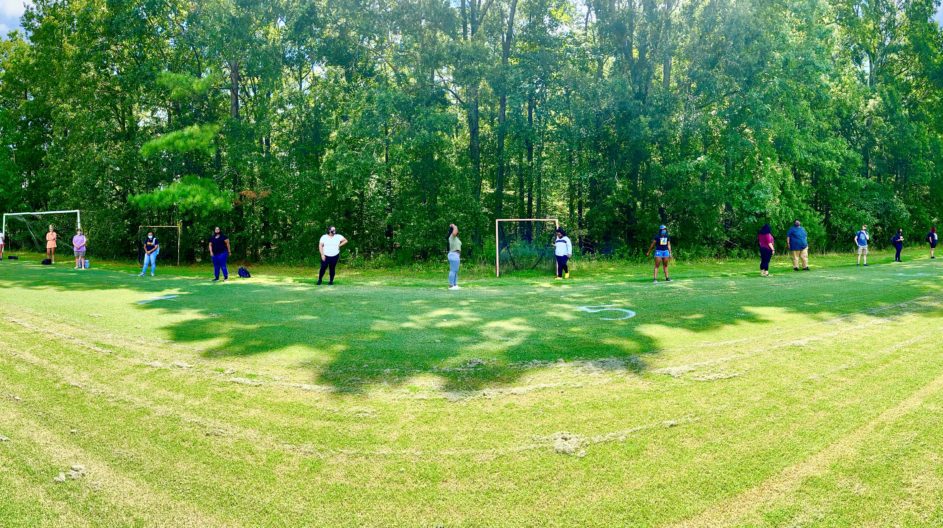
Pfeiffer Offers New Social Justice Studies Minor
Daisha Oliver ’21 of Monroe, NC is on track to earn a Bachelor of Arts degree in Counseling and Human Services next spring from Pfeiffer University. Like many students with her major, she envisions becoming a social worker. So, when she learned that Social Justice Studies, a new minor, could be added to her academic resume, she jumped at the opportunity.
“This minor will significantly enhance my effectiveness as a social worker,” she said. “It will help me better understand the inequalities and injustices affecting my clients, and it will familiarize me with possible solutions to societal problems caused by injustice. I’ll be a stronger advocate for my clients.”
Pfeiffer launched Social Justice Studies at the beginning of the current semester, and Oliver is one of 10 students who are minoring in it. Dr. Aimée Bellmore, an associate professor of Counseling and Human Services at Pfeiffer, developed the Social Justice Studies minor, and she serves as one of its three coordinators, along with two Pfeiffer colleagues: Dr. Danielle Donelson, an assistant professor of English, and Dr. Leah Robinson, an associate professor of religion.
Bellmore is encouraging her department’s majors to minor in Social Justice Studies, calling it a “core ethical requirement” for anyone who works with people, be it as a psychologist, a social worker, a counselor, or a marriage and family therapist. Typically, Pfeiffer’s Counseling and Human Services majors pursue these and similar positions after graduating.
At the same time, the new minor aims to do far more than complement or enhance Counseling and Human Services. Indeed, Bellmore is also plugging the “intentionally transdisciplinary” nature of the Social Justice curriculum, which includes two core courses and about 15 choices for electives, of which four must be taken to fulfil the minor’s requirements.
Social Justice Theory and Practice, one of the core courses, provides a comprehensive overview of the ways that injustice manifests in contemporary society and how narratives are built to maintain structures of privilege and/or marginalization. Passersby on Pfeiffer’s campus may have seen students in this course participate in a Privilege Walk project, which aimed to help students “to understand the intricacies of privilege and to explore the ways that we enjoy privileges based on being members of social identity groups in the United States.” (A photo of the walk accompanies this article.)
The other core course, called Social Justice Internship, enables students to develop professional skills in a variety of community settings through field placement.
As for the elective options, these were conceived in and taught by professors of various departments, including those of English, History, Communication, Religion and Practical Theology, and Counseling and Human Services.
The electives on offer will change each year. This year’s include Race in Literature (English); The Civil Rights Movement (History); and Religion in Modern America (Religion and Practical Theology). In each instance, the idea will be to frame a course’s material around a social justice emphasis, so that majors in the humanities, the arts, and the social sciences can gain insights into how their respective degrees and future vocations can be used to facilitate a more just world.
“In approaching social justice as interdisciplinary, we affirm and acknowledge that, in order to understand it, we must draw from varying subjects,” Donelson said. “Only then may we learn a more genuine, more complete picture of all the factors and subjects and areas of life related to social justice, and to social injustice.
Another benefit of this, of course, is to deliver on what a liberal arts education promises, namely to present differing viewpoints and challenge students to revisit and reconsider common ideologies.”
How will the Social Justice Studies minor build on key facets of Pfeiffer’s culture? There are at least two ways:
First, as Bellmore suggested, the minor brings renewed attention to the fact that the promotion of social justice has long been in Pfeiffer’s DNA. In 1958, for example, an Albemarle resident named Aline Noel applied for admission to Pfeiffer College. Dr. J. Lem Stokes, who was the college’s president at the time, felt she was very qualified and that there was no reason not to admit her. After she was admitted, Noel became the first African American student admitted to an all-white, four-year church-affiliated school in North Carolina.
Second, Social Justice aligns well with servant leadership, a core principle of Pfeiffer’s mission.
“Before one can be a servant leader, one should know about the community and needs and concerns of people within the larger community,” Donelson said. “Exploring social justice areas of concern is certainly one way to learn about a community’s issues, and also to help rising leaders potentially develop empathy and compassion for others.”